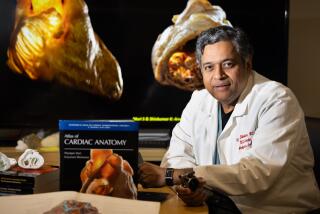The Other News of 1492 : History: A North Hollywood doctor has collected translations of documents describing the Spanish monarchs’ efforts to expel Jews.
- Share via
King Ferdinand and Queen Isabella of Spain are famed as the monarchs who financed Christopher Columbus’ 1492 venture into the unknown.
But they are also remembered as unforgiving persecutors who sought to expel all unconverted Jews from Spain the year Columbus set sail.
The tragedy is detailed in two dozen chronicles that describe-- sometimes firsthand--the deprivation inflicted on tens of thousands of Jews before and after the March 31, 1492, edict. Dr. David Raphael, a North Hollywood anesthesiologist, has collected and edited translations of the medieval documents not usually accessible to the public.
“These documents show what can happen when religious extremism gets the upper hand,” said Raphael, whose family follows the Spanish-Jewish traditions.
Raphael’s book, “The Expulsion 1492 Chronicles,” is being published this week in North Hollywood by Carmi House Press, a private press dedicated to dissemination of literature about the 1492 disaster.
The quincentennial of Spain’s edict against Jews is being observed this year with conferences and ceremonies in this country and abroad.
“Only five of the 25 chronicles had been previously published in English,” said Raphael, who translated the Spanish texts himself. Most of the medieval works are available at UCLA’s Judaica Library, but others are only found in special collections and specialty bookstores, he said.
The accounts in Raphael’s book include the futile pleas of Don Isaac Abravanel, the head of Spanish Jewry, to King Ferdinand to rescind the expulsion decree while Queen Isabella “stood behind him and hardened his resolve.”
Raphael’s book also illustrates the prejudice of the Spanish church and crown. The Spanish Inquisition, which began around 1480 and would last nearly 350 years, especially focused on converted Jews deemed to be unfaithful to Christianity. Many were burned at the stake. Dominican priest Andres Bernaldez, chaplain to the inquisitor-general in Seville, praised “this saintly Inquisition” and railed at the “obstinate and stinking synagogue.”
The ultimate church solution was to rid the country of Jews--despite their contributions to the economic and intellectual fabric of Spain. By 1492, Jews facing exile “exchanged a house for an ass, and a vineyard for a small piece of cloth or linen, because they could not take out either gold or silver,” Bernaldez wrote.
Raphael’s book is praised on the dust jacket as “a genuine contribution” to Jewish history by Yosef Hayim Yerushalmi, professor of Jewish history, culture and society at Columbia University.
But Moshe Lazar, professor of comparative literature at USC, cautioned in an interview that some chronicles in Raphael’s anthology “have data which is erroneous” and that Jewish writers of that era used biblical metaphors and verses to help interpret past events.
“There is certainly no doubt of the brutality of that era, however,” said Lazar. The consensus among scholars is that between 40,000 and 60,000 Jews were converted under duress and perhaps 100,000 left the country as a result of the crown’s order, he said.
Lazar is co-organizer of an international conference at USC of historians and other scholars on the 1492 expulsion. The four-day event begins Sunday night at the Sephardic Temple Tifereth Israel in Westwood.
Raphael, who has written two historical novels and a documentary film on the subject, conceded that the modern reader needs “a little bit of caution” when assessing the historical accuracy of the medieval accounts. Yet, he said, “these are the only set of testimonials we have. Many are personal stories. My feeling is that the Jewish community and the world should not forget those events.”
Today, the 500th anniversary of the expulsion decree, Raphael will present a slide lecture at Temple Emanuel in Beverly Hills under the co-sponsorship of the Simon Wiesenthal Center’s Jewish Studies Institute.
More to Read
Sign up for Essential California
The most important California stories and recommendations in your inbox every morning.
You may occasionally receive promotional content from the Los Angeles Times.












